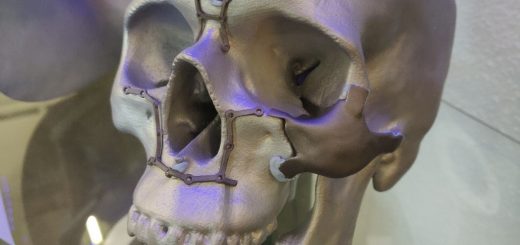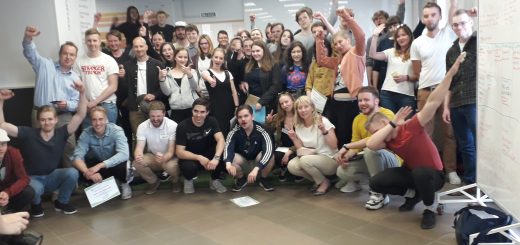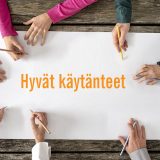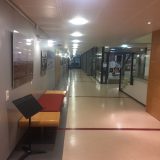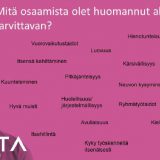Music & NGO Support volunteer in Quito, Ecuador for 5 weeks – part #2
26.6. Day 30 (in Quito)
SHORT(ish) VERSION:
the last week of my volunteering project. Music teaching at a local public elementary school called Inty in the area of La Lucha de los Pobres (the struggle of the poor) in Southern Quito was challenging and rewarding; there are 25-30+ kids in each class (grades 1-7 first one being pre-school for 6-yearolds), there aren’t many instruments available so creativity was needed – main instruments were vocals and body percussions.
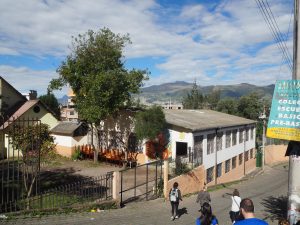
Inty School
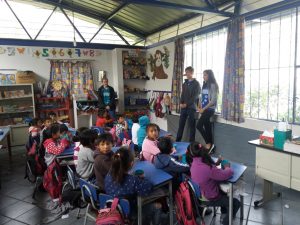
Michaela, Jesse & Maggie at it
The public schools in general are struggling with their resources and it is hard to afford teachers for English, music and physical education which is why they have volunteers in these areas. I was very lucky to have roommates/colleagues from the States who are studying to be music teachers who had a lot of kids’ songs in store. And they speak good Spanish. 😊
I am currently doing NGO support as a volunteer for a local organization called UBECI more of which in another post shortly. Also more on conclusions of the whole experience after getting back home is on its way (which will happen mid-July after a short backpacking holiday in Colombia).
Especially all of you teachers or studying to become one I warmly recommend this type of project/experience but definitely this is for anyone. There are a lot of organizations through which you can volunteer around the world. I selected an organization called International Volunteer HQ and am happy to share my experiences in person and more in detail – please feel free to get in touch. Last week I learnt that there is a family volunteering i.e. a mother with her kids in UBECI street children project. Super cool.
LONG VERSION:
although you know that some of the children in Inty school come from families that struggle to make ends meet, kids are super warm and there is so much love! They are noisy, get excited in a second and are constantly giving hugs or are climbing into your lap. We learnt to take the first and second graders outside during the double class as 80 minutes is a very long time to focus and might result in a full-blown chaos in the small classroom… Hypothetically, that is. Our soon-to-become-pro-music-teachers, my and the kids’ heroes Michaela and Jesse, had a lot of songs and games in store also in Spanish. Without them I would have needed to make a few emergency phone calls to my friends in the business of teaching music to young children… However, Ukko Nooa became a bit of a hit although nowhere close to M&J’s Kumala Kumala. 😉
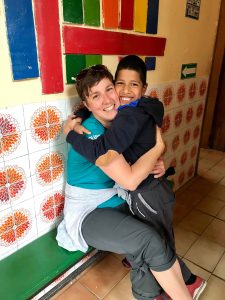
This fabulous guy will be Singer Superstar in Ecuador one day!
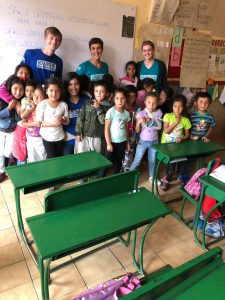
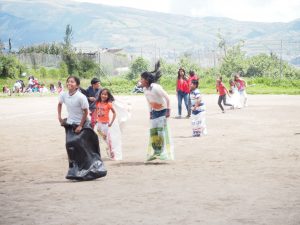
The school starts at 7 am ending at 12:30 with lunch, and in some schools there is another group of children coming to school in the afternoon. We taught music 2 hours weekly for all grades except 1st and 2nd grades had 3 hours. As there was no official curriculum for music and the teachers didn’t have many requests, it was up to us to decide and plan what we will do. After the first week having tested a few things and gotten to know the children better the planning and the implementaion became a little easier. The principal and the teachers could not have been more welcoming and supportive, and the great majority of the children welcomed us with open arms (and a lot of noise!!) to the classroom for the music lessons. There is a 40-minute break for the entire school which usually is spent in the field next to the school playing football and generally goofing around with everyone. This I found priceless.
Otherwise everyday routines in Quito were established quickly. The first week was a little rough getting used to the altitude (which in Quito is 2 850m) and the second week my stomach wasn’t too pleased with the change in the bacteria. The light wakes me up every morning around 6 when I go for a run (or more like ”run” in this altitude…) or do my exercises in the park where I’ve made a few friends. I think that is the coolest thing ever; there are groups of pensioners who have a date between 6-7 am to do exercising and gossiping. Then it’s about going to work, lunch, Spanish classes, working on studies and other stuff, dinner at our homestay etc.
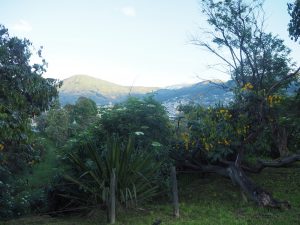
My jogging park
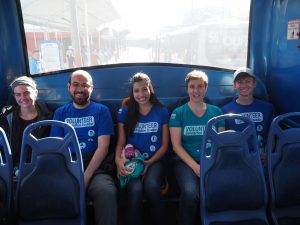
Going to work!
The volunteering organization places us with a family or a house assigned for volunteers. I was very lucky to be placed in a house of a couple who are fantastic characters and take such good care of us. They make us speak Spanish and make sure we behave.
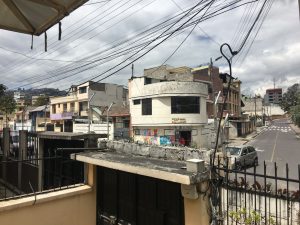
A view from our house to the street
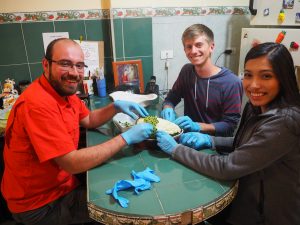
Us doing chores! Guess what the fruit is called?
Grassroot observations of the everyday life in Quito & Ecuador:
people are in general super friendly and helpful even though the communication is a bit tricky with someone like me speaking basic Spanish. That is where the “sign language” kicks in. I was “stranded” by the Pan-American highway after hopping off the Cotopaxi tour bus somewhere around Machachi wanting to continue South. I would have a fab photo but was way too frozen to take it!!! Close to 10 buses went by before one finally picked me up. We were dropped “in Latacunga” which was a massive roundabout above the highway with no sight of a town. I was ambushed by a local “taxi” when an elderly lady told me that no taxis, we use the bus. We hopped on a local bus a few minutes later which took us to the town. The lady sat next to me on the bus, told me that she’s lived all her life in Latacunga and was curious where I came from and how come I was there. After we got to the town she turned back to see that I was finding my way.
Quite the opposite happened at Quilotoa where I was asking for directions for hiking around the crater rim. There was a local business man with his mules who told me that the hike takes 8 hours and I’d be better off riding his mule. I said that I wanted to walk when he offered to be my guide. I said that that isn’t necessary either – would just like to know where to find the trail. He said that he doesn’t know. I asked if his mules would know but didn’t get an answer. I decided to do the hike counter clockwise and found the beginning of the route. When I finished my 4,5 hour hike around the crater, I was back to the place where the businessman had been standing with his mules – in the precise place where the trail starts. Guess he forgot. But anyways, almost everybody is super friendly except what comes to traffic; when Ecuadorians are behind the wheel or are pushing themselves into the bus the place becomes a jungle with prison rules!
The breakfast is superlight: a croissant with jam and coffee which is compensated by a heavy lunch. They love their meat and rice here inland so not really a paradise for a salad-loving vegetarian like me I’m afraid.
It gets painfully cold at night inside the houses as there is no heating and the doors and windows, should I say, allow very good air circulation. The temperature is around +5 degrees Celsius at night which means that the souvenir alpaca wool shawl for my mum has been in use… With this amount of sun they could do wonders with solar power in these latitudes!!
The railroad is not in use which means buses are the main method of getting around. They are cheap and most of them are in good shape. However, they tend to be a bit slow as people are picked up and let off basically anywhere. And the oddest thing; they show movies on buses that are often crazy violent such as Death Race (1 and 2). What?!! Also you’d be surprised what people carry on buses when they don’t have cars such as living ducks.
I never realized before that in these latitudes judging a tree’s age is difficult as they don’t have annual rings here.
And now to the interesting bits – what do people that I’ve met know of Finland. Several people have mentioned Finland’s exemplary schooling system. I have graciously received the compliments with a lot of pride and have explained that we value education and our teachers are highly educated and super competent. Would that be correct, experts…? Additionally, our happiness seems to be fairly well known. We are terribly well off and I’m glad we, at least some of the time, recognize and remember to appreciate it. For one though, I would remove the taxes on restaurants and hanging out activities in general. Us eating & drinking (civilly) outside with or at least surrounded by other people should be so cheap that we would do it all the time. I’m sure that investment would pay off longer term in even higher happiness rates.
And yes, I’ve been doing traveling during the weekends in this amazing country with so much to see and do. More of that later on.

